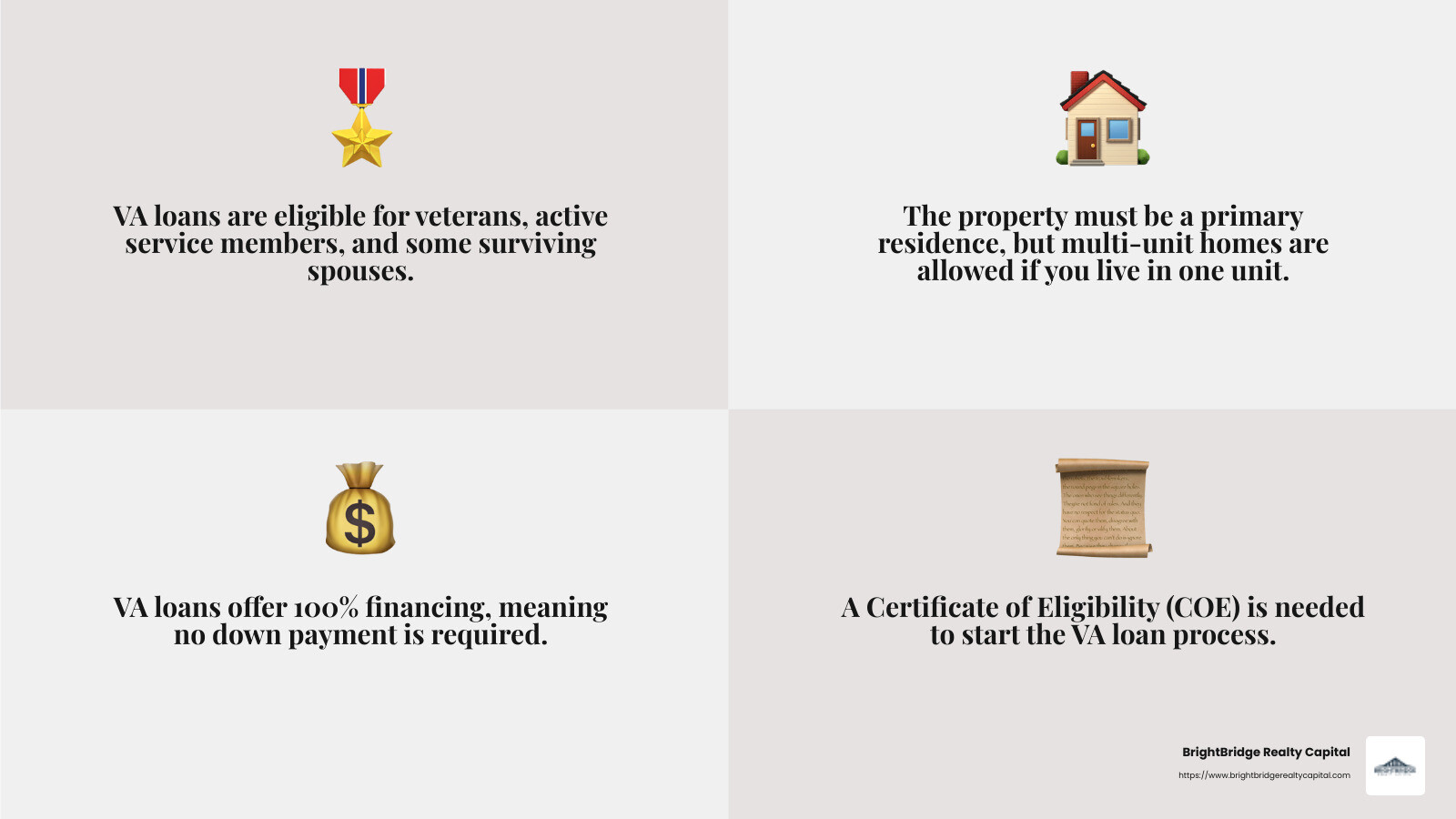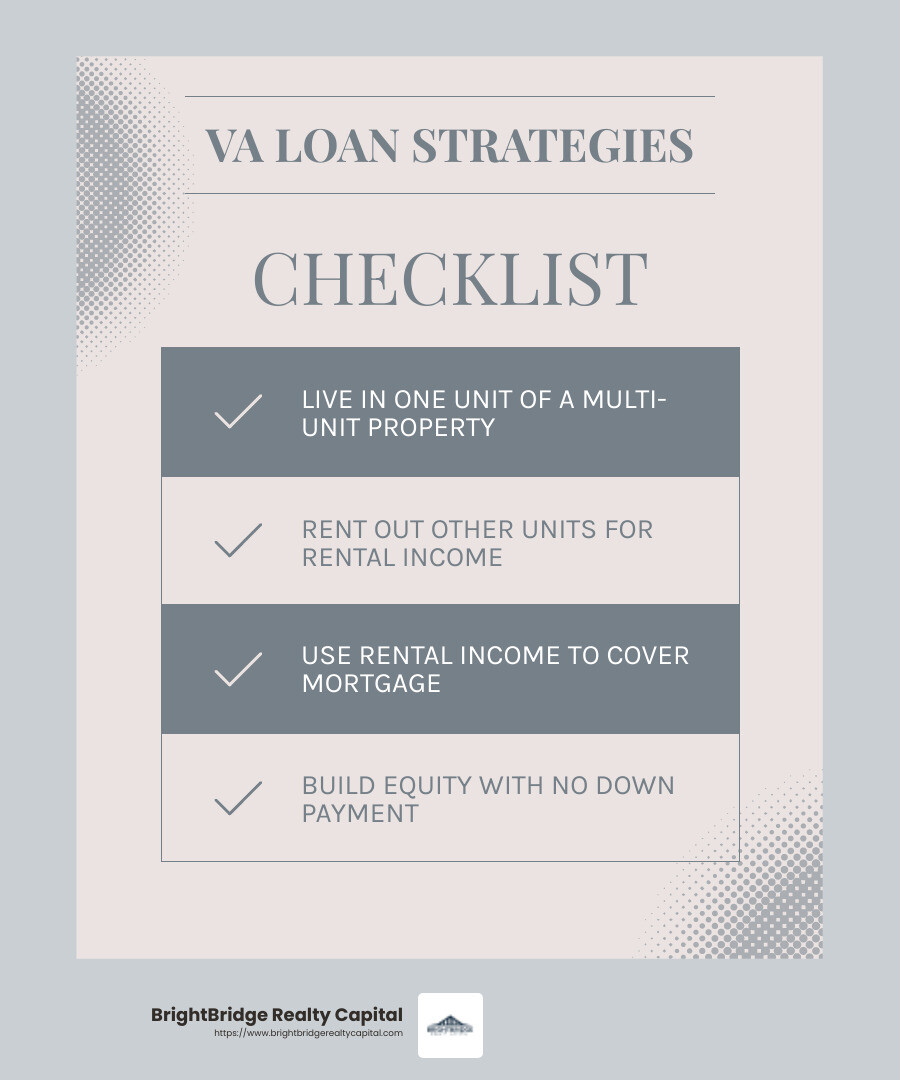From Service to Success: Investing in Real Estate with a VA Loan

Using va loan for real estate investment can be a smart move for veterans, service members, and their families looking to build financial stability and wealth. While VA loans are primarily designed for purchasing a primary residence, savvy investors can leverage them to explore real estate investment opportunities.
- Primary Use: Buy a primary home with little to no down payment.
- Investment Strategy: Live in one unit of a multi-unit property and rent out the others.
- Creative Use: Capitalize on equity from a VA-loan-purchased home to fund other investments.
VA loans aren’t just for primary residences. They open doors to investment possibilities that can pave the path to financial success. Imagine buying a four-unit property, living in one, and renting out the others. This approach can offset your mortgage payments and generate passive income, setting the stage for wealth accumulation.
But how can VA loans fuel your investment goals more effectively? Understanding the nuances of this unique benefit and how to strategically position it can be the key to open uping a prosperous real estate portfolio.

Using va loan for real estate investment word guide:
- buying rental property with va loan
- owner occupied loan for investment property
- refinancing primary residence to investment property
Understanding VA Loan Basics
When it comes to using VA loans for real estate investment, understanding the basics is crucial. Let's break down the key components that make VA loans a unique and advantageous option for eligible veterans and service members.
Eligibility Requirements
To qualify for a VA loan, you need to meet specific eligibility criteria. These include being an active duty service member, a veteran, or a surviving spouse. The U.S. Department of Veterans Affairs provides a Certificate of Eligibility (COE), which you must obtain to apply for a VA loan. This certificate confirms your entitlement and is a vital step in the loan process.
Primary Residence Requirement
VA loans are designed primarily for purchasing a primary residence. This means the home you buy using a VA loan must be your main living place. However, the rules allow you to buy multi-unit properties, like duplexes or four-plexes, as long as you live in one of the units. This opens up opportunities to generate rental income while fulfilling the primary residence requirement.
No Down Payment
One of the most significant advantages of a VA loan is the no down payment feature. Unlike conventional loans, which often require a substantial down payment, VA loans allow eligible borrowers to finance 100% of the home's value. This benefit can free up your capital for other investments or expenses, making it easier to enter the real estate market.

Making the Most of Your VA Loan
By understanding these basics, you can leverage a VA loan not just for buying a home, but also as a stepping stone into real estate investment. Whether you're house hacking by renting out spare rooms or purchasing a multi-unit property, the VA loan program offers unique opportunities for financial growth.
Next, let's explore how you can strategically use a VA loan for real estate investment, focusing on occupancy requirements and multi-unit properties.
Using VA Loan for Real Estate Investment
When you're using a VA loan for real estate investment, understand how the program's requirements can be leveraged to maximize your investment potential. Let's dig into some key strategies and requirements.
Occupancy Requirements
VA loans are primarily intended for purchasing a primary residence. This means that you must live in the property you buy using a VA loan. However, there's a strategic advantage here. You can buy a multi-unit property (up to four units) and live in one unit while renting out the others. This approach not only meets the occupancy requirement but also provides an opportunity to generate rental income.
Multi-Unit Properties
Purchasing multi-unit properties with a VA loan can be a smart investment move. By living in one unit and renting out the rest, you can offset your mortgage payments with rental income. This strategy is often referred to as "house hacking." The beauty of this approach is that it allows you to begin building equity and passive income with minimal upfront costs, thanks to the VA loan's no down payment feature.
- Example: A veteran buys a four-plex using a VA loan. They live in one unit and rent out the other three. The rental income from the three units helps cover the mortgage, lowering the veteran's living expenses significantly.
House Hacking
House hacking is a popular strategy among veterans using VA loans. It involves renting out parts of your primary residence, like spare bedrooms or a basement suite, to help cover mortgage costs. This strategy is particularly beneficial for those who buy single-family homes and want to make the most of their property.
- Tip: If you choose to house hack, ensure that you adhere to local zoning laws and rental regulations to avoid potential legal issues.

By understanding and applying these strategies, veterans can effectively use their VA loan benefits to enter the real estate market, generate income, and build wealth over time. Next, we'll explore alternative financing options for those who might not meet the VA loan criteria or are looking to expand their investment portfolio.
Strategies for Investment with a VA Loan
When it comes to investing with a VA loan, there are several savvy strategies to consider. Let's explore how house hacking, multi-unit properties, and mixed-use spaces can turn your VA loan into a powerful tool for building wealth.
House Hacking
House hacking is a clever way to make your home work for you. With this strategy, you live in your property and rent out part of it to generate income. This could mean renting a spare bedroom or converting a basement into a rental unit.
- Example: Suppose you buy a three-bedroom home. You live in one room and rent out the other two. The rental income can help cover your mortgage, reducing your living expenses.
Why it works: House hacking allows you to maximize your investment by reducing your out-of-pocket housing costs. Plus, it offers a way to dip your toes into real estate investing with minimal risk.
Multi-Unit Properties
VA loans are not just for single-family homes. You can purchase multi-unit properties (up to four units) and live in one unit while renting out the others. This approach is often called "house hacking" on a larger scale.
- Example: A veteran purchases a triplex with a VA loan. They live in one unit and rent out the other two. The rental income from the two units significantly offsets the mortgage payment.
Benefits: This strategy helps build equity faster and generates passive income. It’s an excellent way to start a real estate portfolio with little to no down payment, thanks to the VA loan's benefits.
Mixed-Use Spaces
Mixed-use properties combine residential and commercial spaces. A VA loan can be used to purchase these properties as long as the residential portion is the primary use.
- Example: A veteran buys a property that is 75% residential and 25% commercial. They live in the residential part and rent out the commercial space to a small business.
Considerations: This strategy diversifies your income sources and can increase the property's overall value. However, ensure the commercial space doesn't exceed 25% of the total area to comply with VA loan requirements.
By leveraging these strategies, veterans can effectively use their VA loan benefits to enter the real estate market, generate income, and build wealth over time. Next, we'll explore alternative financing options for those who might not meet the VA loan criteria or are looking to expand their investment portfolio.
Alternative Financing Options
While using a VA loan for real estate investment is a fantastic opportunity for eligible veterans, it's not always the perfect fit for every scenario. Let's explore some alternative financing options that can help you grow your real estate portfolio, even if a VA loan isn't the right choice.
Conventional Loans
Conventional loans are a popular choice for those who might not qualify for a VA loan or are looking to invest in properties without living in them. These loans are not insured by the government and typically require a higher credit score and a larger down payment, often around 20% of the property's purchase price.
Benefits: Conventional loans offer flexibility in property types and don't have the primary residence requirement of VA loans. This makes them suitable for purchasing investment properties that you don't plan to live in.
Considerations: Conventional loans may come with private mortgage insurance (PMI) if your down payment is less than 20%. This can increase your monthly costs.
Non-QM Mortgages
Non-QM (Non-Qualified Mortgage) loans provide an alternative for those with unique financial situations. These loans don't conform to the standard requirements of conventional loans, making them ideal for individuals with irregular income or less traditional employment histories.
Why choose Non-QM? If you're self-employed or have fluctuating income, Non-QM loans allow you to qualify based on bank statements or assets rather than traditional income verification methods.
Flexibility: Non-QM loans often have more flexible terms and can be customized to fit your specific financial situation, though they may come with higher interest rates.
DSCR Loans
Debt Service Coverage Ratio (DSCR) loans are designed for real estate investors who want to qualify based on the property's income potential rather than their personal income. This makes them an attractive choice for those looking to expand their rental property portfolio.
How it works: DSCR loans focus on the cash flow generated by the property. If the rental income covers the mortgage and other expenses, you might qualify for this type of loan.
Advantages: DSCR loans can be a great way to leverage a property's income without the need for personal income verification. They are particularly useful for seasoned investors with multiple properties.
By understanding these alternative financing options, you can choose the best path for your real estate investment journey, whether you're a veteran utilizing a VA loan or exploring other avenues. In the next section, we'll dive into some frequently asked questions about using VA loans for real estate investment.
Frequently Asked Questions about Using VA Loan for Real Estate Investment
Can you use a VA loan for an investment property?
Yes, you can use a VA loan for an investment property, but there are specific occupancy requirements you must meet. The VA mandates that the property must be your primary residence. However, you can still make it an investment by purchasing a multi-unit property (up to four units) and living in one of the units while renting out the others. This is often referred to as "house hacking."
How can rental income affect VA loan qualification?
Rental income can play a significant role in qualifying for a VA loan. Lenders often consider projected rental income when calculating your debt-to-income ratio (DTI). This ratio compares your monthly debt payments to your gross monthly income. A lower DTI can improve your chances of loan approval. If you plan to rent out part of the property, lenders may count a portion of the projected rental income as part of your income, which can help you qualify for a larger loan amount.
What are the benefits of using a VA loan for investment?
Using a VA loan for investment comes with several advantages:
No PMI: Unlike conventional loans, VA loans do not require private mortgage insurance (PMI), even if you make a small or no down payment. This can save you a significant amount of money over time.
Competitive Interest Rates: VA loans typically offer lower interest rates compared to conventional loans. This means you can enjoy lower monthly payments and save on interest costs over the life of the loan.
These benefits make VA loans an attractive option for eligible veterans looking to invest in real estate while minimizing costs and maximizing potential returns.
In the next section, we'll explore some strategies for investment with a VA loan, including house hacking and investing in multi-unit properties.
Conclusion
Investing in real estate can be a powerful way to build wealth, and using a VA loan can make this journey even smoother for eligible veterans. VA loans offer unique benefits, like no private mortgage insurance (PMI) and competitive interest rates, which can significantly reduce your costs and increase your potential returns.
At BrightBridge Realty Capital, we understand the value of these advantages and are here to help you steer your investment journey. Our expertise in real estate financing means we can offer customized solutions that fit your specific needs. Whether you're interested in house hacking, investing in multi-unit properties, or exploring mixed-use spaces, we provide fast, flexible funding to keep your projects moving forward.
Our nationwide reach and commitment to quick closings—often within a week—ensure you can seize investment opportunities as they arise. Plus, as a direct lender, we eliminate intermediaries, offering you competitive rates and a seamless process.
Explore our financing options to see how we can support your real estate investment goals. With the right strategies and support, you can transition from service to success in the real estate market.


